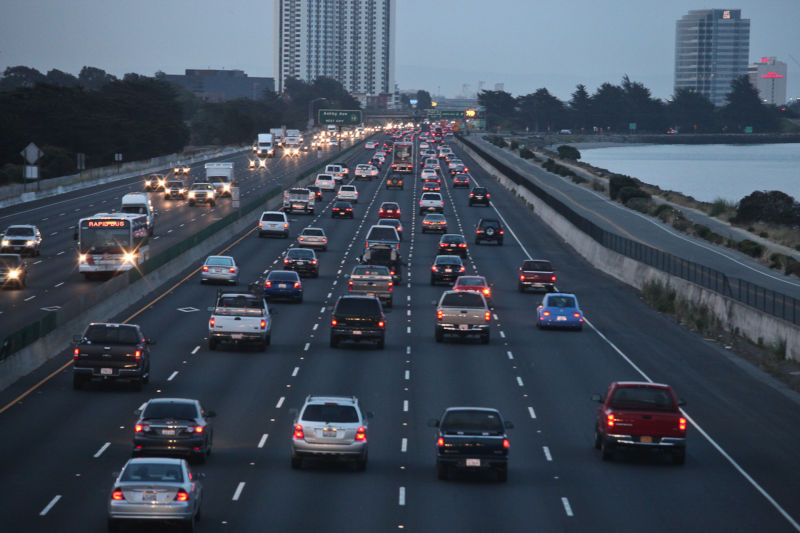The effort failed to find enough Republicans in the Legislature willing to endorse new taxes or fees to help fund what has been estimated to be a $6 billion annual shortfall in keeping up with road, highway and transit needs.
Meantime, a number of other bills cleared key hurdles, or went to the governor's desk, on Wednesday.
End-of-Life Choices: The day's most intense debate ended with the Assembly approving the closely watched bill to allow doctors to prescribe life-ending medication, and the proposal now headed to the state Senate. ABX2-15 by Assemblywoman Susan Talamantes Eggman, D-Stockton, was the focus of a floor debate that lasted some two hours. There was no clean split along party lines, with some Democrats opposed and a few Republicans in support.
"I certainly don't take this lightly," said Eggman in her closing remarks, offered while fighting back tears. Other legislators also grew emotional during the debate.
Supporters say it remains unclear whether the bill will next have one final policy committee hearing before the Legislature adjourns Friday night, or whether it heads directly to the Senate floor.
No Toll For Walking On The Golden Gate Bridge: The body overseeing the Golden Gate Bridge may soon be barred from imposing a toll on walkers and bikers, after the Legislature sent the governor Assembly Bill 40 Wednesday.
The bill by San Francisco Democratic Assemblyman Phil Ting, if signed by Brown, would prohibit sidewalk tolls for pedestrians and cyclists crossing the Golden Gate and state-owned toll bridges. The cash-strapped bridge district has twice voted to study such a fee, but Ting sought to tie the ban to the subject du jour in Sacramento: Climate change.
“The impact of foot and pedal power cannot be overlooked as we strive to combat climate change. We should not discourage these healthy transportation alternatives by nickel-and-diming people who are part of the solution,” he said in a written statement.
State Funded Recounts In Close Elections: Lawmakers sent the governor a bill debated now for more than a year, sparked by 2014's close contest in the race for state controller. Assembly Bill 44 by Assemblyman Kevin Mullin, D-South San Francisco, allows the governor to order a recount in any statewide race (either for a statewide office or a ballot measure) where the gap between second and third place for candidates, or passage and defeat for a ballot measure, is either less than 1,000 votes or 0.00015 of the votes cast.
Abortion Clinic Access: Legislation to allow independent primary care clinics -- including those that offer abortion services -- to secure a state license cleared the state Senate and headed back for a final vote in the Assembly ... but not before sparking some heated fireworks.
State Sen. Richard Pan, D-Sacramento, said that Assembly Bill 1177 is an attempt to help clinics that can't get a license because no nearby hospital will sign an agreement for transferring patients.
"It's become politicized," said Pan, a physician. "Because of that politicization, people have been denied reproductive services."
But Republicans accused Democrats of trying to expand these services at a risk to women. And one senator angrily suggested he was being criticized for speaking out.
"Some of my colleagues on this floor believe I have to have a uterus to have an opinion," said Sen. Joel Anderson, R-Alpine.
Racial Profiling Bill: The Senate passed a bill that would drastically expand the data collected and made public by police departments -- one aimed at improving relations between law enforcement and communities of color.
Assembly Bill 953 would require all police agencies to report extensive data on each contact they make with a member of the public, including the perceived race and ethnicity of the person. The information would be handed over to the State Attorney General’s Office, where a new body would be charged with improving racial sensitivity in law enforcement.
While Republican lawmakers said the bill would distract police officers from their job of policing, and insisted that racial bias problems among law enforcement officers have improved, Sen. Holly Mitchell, D-Los Angeles, pushed back.
Mitchell said the only way to improve communication between the public and police is to have real data on which to base those talks.
"The reality is that 1,000 Californians lost their lives at the hands of law enforcement between 2008 and 2012. Twenty percent of them were African-American, in a state where the population of African-Americans is less than 6 percent," she said. "The time has come to have a clear conversation with law enforcement about what we as society no longer accept, and that's racial profiling by those who indeed take an oath to protect and serve us all equally."
The bill faces one more vote before it can be sent to Brown.
